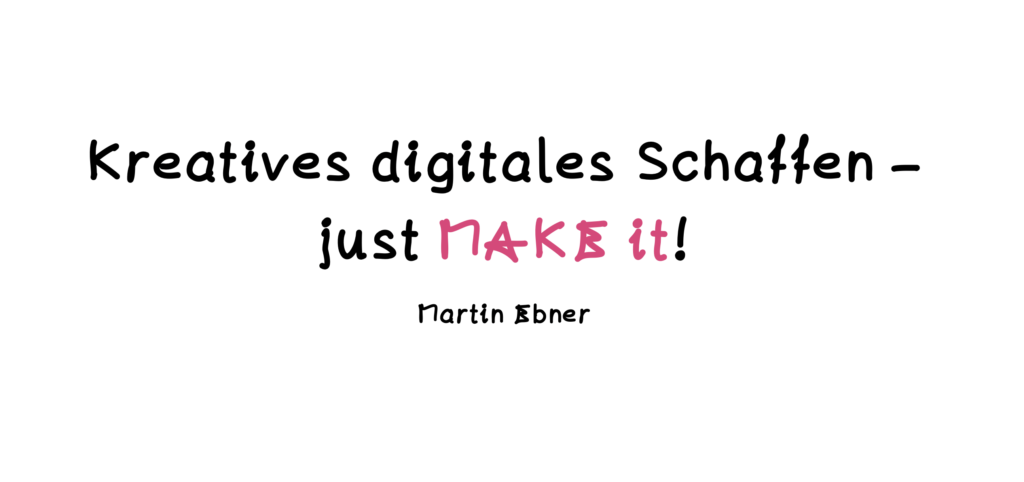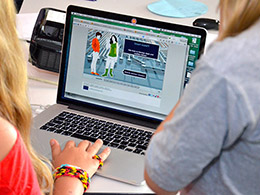Ich durfte gestern die Keynote zur Maker Education Konferenz 2023 an der PH Ludwigsburg halten, hier liefere ich noch schnell die Folien nach:


Digitale Lehre an und rund um der Technischen Universität Graz
Ich durfte gestern die Keynote zur Maker Education Konferenz 2023 an der PH Ludwigsburg halten, hier liefere ich noch schnell die Folien nach:

Es freut uns, dass diese Woche ein weiterer MOOC auf iMooX.at gestartet ist mit dem Titel „Digital unterstützt draußen lernen“ und es ist auch der erste MOOC der Hochschule für Agrar- und Umweltpädagogik 🙂
In diesem MOOC wird erklärt und geübt, wie digitale Medien und Methoden in Outdoor-Lernsettings integriert werden können. Der MOOC bietet einen Überblick über digitale Tools und geht der Frage nach, welchen didaktischen Nutzen diese haben und wie eine gute Mischung zwischen realem Erlebnis und digitalen Anwendungen gelingen kann. Ziel des MOOC ist es, die Teilnehmer*innen dabei zu unterstützen, einen konstruktiven, kritischen und neugierigen Umgang mit digitalen Tools bei ihrer Bildungsarbeit mit und in der Natur zu entwickeln und umzusetzen.
Hier gibt es auch den Trailer zum MOOC:
Selbstverständlich ist die Teilnahme kostenlos: [Anmeldung zum kostenlosen MOOC]
 Es freut mich, dass heute der MOOC zu „Lehren und Lernen mit digitalen Medien I“ startet. Diese MOOC ist primär für eine Lehrveranstaltung des Entwicklungsverbundes-Süd-Ost der PädagogInnenBildung NEU vorgesehen und Teil der gesamten Ausbildungsinitiatve zu „Digitale Kompetenzen für Lehramtsstudierende“. Diese Lehrverastaltung soll helfen zukünftige Lehrerinnen und Lehrer fit zu machen für das neue digitale Zeitalter. Auch dürfen wir ankündigen, dass der MOOC runderherum mit großem Aufwand erneuert wurde um den neuesten Entwicklungen im Themenfeld entsprechend Rechnung zu tragen – hier einen großen Dank an alle meine Kolleg:innen für die tolle Arbeit.
Es freut mich, dass heute der MOOC zu „Lehren und Lernen mit digitalen Medien I“ startet. Diese MOOC ist primär für eine Lehrveranstaltung des Entwicklungsverbundes-Süd-Ost der PädagogInnenBildung NEU vorgesehen und Teil der gesamten Ausbildungsinitiatve zu „Digitale Kompetenzen für Lehramtsstudierende“. Diese Lehrverastaltung soll helfen zukünftige Lehrerinnen und Lehrer fit zu machen für das neue digitale Zeitalter. Auch dürfen wir ankündigen, dass der MOOC runderherum mit großem Aufwand erneuert wurde um den neuesten Entwicklungen im Themenfeld entsprechend Rechnung zu tragen – hier einen großen Dank an alle meine Kolleg:innen für die tolle Arbeit.
Selbstverständlich ist der MOOC frei zugänglich und wir freuen uns wirklich wenn auch viele andere die Inhalte nützlich finden 🙂
Hier gibt es aber nun das Einführungsvideo mit einer kleinen Überraschung – man hat mich tatsächlich in eine Küche gestellt. Viel Spaß damit:
Die Anmeldung zum MOOC ist kostenlos und kann jederzeit gerne gemacht werden [Anmeldung zum MOOC]
Our chaper about „Supporting Learning and Teaching with Good Design: Report and Lessons Learned from Learning Experience Design in Higher Education“ got published (online first) and is free available 🙂
Abstract:
Learning experience design (LXD), that is, the conscious design of learning experiences based on the principles and methods of the design discipline, is a term that is increasingly being used in the design of (digital) learning environments. The aim is to make learning a positive, exciting experience for the learner. This article will introduce the understanding of “learning experience design” and describe its application at Graz University of Technology (TU Graz). As creativity is a base for the design discipline, the organizational unit “educational technology” sees LXD as a chance to develop innovative, quality online teaching and learning materials. The article will show the application and results of LXD of several different projects and resources developed for teachers and students by the educational technology team at TU Graz: the student study progress dashboard, the TELucation website relaunch, and the development of a modifiable digital template for lecturer training.
[chapter @ book’s homepage]
[chapter @ ResearchGate]
Reference: Ebner, M., Edelsbrunner, S., & Schön, S. (2022). Supporting Learning and Teaching with Good Design: Report and Lessons Learned from Learning Experience Design in Higher Education. In K. Kang, & M. F. Namisango (Eds.), E-service Digital Innovation [Working Title]. IntechOpen. https://doi.org/10.5772/intechopen.107489
Es freut uns, dass nun – schon fast traditionell – der Brückenkurs zur Mathematik gestartet ist. Ein MOOC der dazu dienen sollen, dass Schülerinnen und Schüler nochmals üben können, was für den guten Start ins Studium an den Technischen Universtitäten notwendig ist. Der Kurs wurde für 2023 überarbeitet und wiederum aktualisiert. Auch gibt es wieder eine MATLAB-Integration, mit der man üben kann. Die Lernziele sind dabei folgendermaßen definiert:
Dieser MOOC soll Schülerinnen und Schüler im Bereich Mathematik frühzeitig auf den Übergang an eine technische Hochschule vorbereiten. Die Inhalte zielen auf eine Wiederholung, Festigung und Vertiefung des Oberstufen-Lehrinhalts im Fach Mathematik ab und bereiten damit auf die Studieneingangsphase eines technischen Studiums und alltägliche Fertigkeiten eines technischen Studiums vor.
[Anmeldung ist jederzeit hier noch kostenlos möglich]
Uns als Vorgeschmack gibt es hier das Bild des ersten Videos – der Rest dann im Online-Kurs 🙂
Unser gemeinsames Kapitel zu „Erwachsenenbildung und MOOCs“ ist nun als Buchkapitel erschienen – vielen Dank vorweg auch für die gute Zusammenarbeit.
Zusammenfassung:
Mit der Abkürzung MOOC für „Massive Open Online Courses“ werden Online-Kurse bezeichnet, die mehr als 150 TeilnehmerInnen erreichen. Diese Lern- und Darbietungsform von Inhalten für sehr viele Personen, auch aus unterschiedlichen Einrichtungen und persönlichen Situationen, ist auch für die Erwachsenen- und Weiterbildung interessant. Auf der österreichischen MOOC-Plattform iMooX.at werden seit 2014 MOOCs mit offen lizenzierten Bildungsmaterialien von Hochschullehrenden angeboten, die ohne weitere Zugangsvoraussetzungen (wie z. B. Hochschulreife) genutzt werden können. Einige der Online-Kurse sind explizit der Erwachsenen- und Weiterbildung zuzuordnen und werden von EB-Einrichtungen (mit-)veranstaltet. Die Verantwortlichen für diese MOOCs mit insgesamt etwa 21.000 registrierten TeilnehmerInnen und mehreren Auszeichnungen tragen in dieser Veröffentlichung ihre Erfahrungen zusammen: Wo liegen Potenziale von MOOCs? Wo gibt es Schwierigkeiten und Herausforderungen? Welche Empfehlungen gibt es für NachahmerInnen? Dieser Beitrag ist somit ein kondensierter Blick auf den aktuellen MOOC-Einsatz in der Erwachsenenbildung und unter der Voraussetzung der Nutzung offen lizenzierter Bildungsmaterialien.
[Kapitel @ Homepage des Buches]
[Vorabversion @ ResearchGate]
Zitation: Schön, S., Edelsbrunner, S., Ebner, M., Aschemann, B., Bisovsky, G., Eglseer, D., Kreiml, T., Lanzinger, M., Reisenhofer, C., Steiner, K. (2022). Erwachsenenbildung und MOOCs. In: Egger, R., Witzel, S. (eds) Hybrid, flexibel und vernetzt?. Doing Higher Education. Springer VS, Wiesbaden. https://doi.org/10.1007/978-3-658-37204-0_12
Last year we gave a talk at the Open Education Conference about „Synergies between Open Education and Open Science: OER Development, Projects and Trends in Austria„. Find here our recorded talk:
Reference: Ebner, Martin; Hackl, Claudia & Schön, Sandra (2021). Synergies between Open Education and Open Science: OER Development, Projects and Trends in Austria. Presentation at Open Education Week 2021, October 18-22, Recording: opened21.sched.com/event/moOv/synergies-between-open-education-and-open-science-oer-development-projects-and-trends-in-austria
Im FNMA-Magazin 1/2022 haben wir die Ergebnisse des Webinars im Dezember 2021 nochmals zusammengefasst unter dem Titel „Weitere österreichische Hochschulen veröffentlichen eine Policy zu offenen Bildungsressourcen – Zum Austausch der AG OER„:
Bei der fnma-Arbeitsgruppe zu offenen Bildungsressourcen dreht sich alles um die bisherige Entwicklung und Förderung von OER. Anfang Dezember 2021 ging es um Erfahrungen mit der Erstellung von strategischen Bekenntnissen und Maßnahmen österreichischer Hochschulen.
[Artikel @ ResearchGate]
[FNMA-Magazin 1/2022]
Zitation: Ebner, Martin und Schön, Sandra (2022). Weitere österreichische Hochschulen veröffentlichen eine Policy zu offenen Bildungsressourcen – Zum Austausch der AG OER. In: fnma Magazin, 1/2022, S. 7-9.